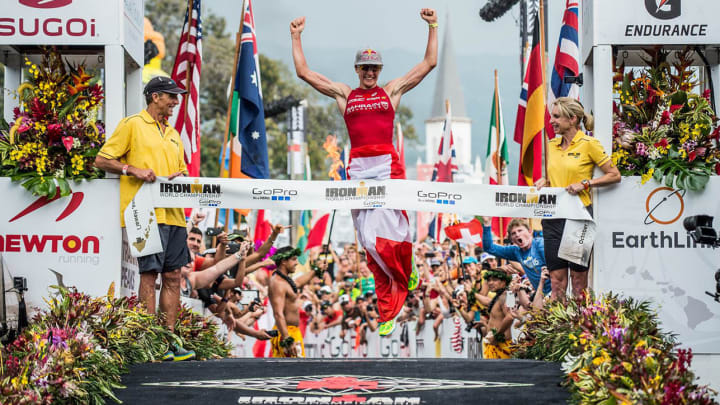Catching Up with Paula Newby-Fraser Ahead of the 2019 Ironman World Championships

More than two months out from the October 12th Ironman World Championships in Kailua-Kona, Hawaii, the “Queen of Kona” is confident and ready to make predictions about the race. Now retired, Paula Newby-Fraser earned her royal nickname after winning 21 Ironman triathlon titles and eight Ironman World Championships in Kona (more than any other athlete, male or female, in the event’s 36-year history) and she remains close to the sport, mentoring pro athletes such as Hines Ward and Apolo Ohno as they tackle the triathlon and continuing to keep up her fitness—even if it’s a lot less intense nowadays.
The following interview has been edited for clarity.
How has triathlon changed from when you competed?
Newby-Fraser: The proliferation globally, the growth of the sport everywhere, is just mind-boggling. I’ve been involved with Ironman in some capacity in my life for over 30 years. What’s so special about it is that it does continue to catch people, everywhere—India, the Philippines, Kazahkstan, you name it, we have events. And athletes can’t get enough of it. So to me, that’s one of the biggest changes. It’s something that people connect deeply to.
The other thing re all of the adjunct things around the sport—coaching, equipment, training methods and techniques. Those things have deepened and evolved remarkably. I look at the bikes that the athletes ride now and I say, Can you go to the moon on that thing? You don’t even have to shift anymore, you just push a button! It’s amazing. And then the supportive technology in your watches and heart rate monitors and all of that. They engineer their nutrition and the volume now of information that everybody has regarding training. When I started, we were sort of like, OK, guys, what are we doing today? But now there’s tried and true way to do things and the athletes coming into the sport don’t need to make as many mistakes as we made along the way. There’s a lot of good data now.
The sport has grown up. And there’s starting to be some real history to it. And I think that that’s marvelous.
Do you still compete? How has your training evolved since you retired?
PNF: I don’t compete anymore. I would consider myself more of a lifestyle athlete now. I’m active. It’s the difference between training and working out—and I workout. I absolutely continue to workout everyday, not necessarily swim-bike-run. I love running, I love riding my mountain bike, I love going to the gym. Health, fitness, sports and exercise—these are things I will always do as long as I can get myself out of bed in the morning, I’m out there doing something. The day isn’t really complete for me without moving—it’s my meditation.
What is one thing that you see in triathlon today that you’d say is the biggest change in the sport?
PNF: I would say the biking equipment, and the aerodynamic and hydrodynamic equipment, are probably the two biggest things that I look at go: This is amazing. I used to wear a little two piece but now just the hydrodynamics of the fabrics and everything.
What impresses you most about the athletes now?
PNF: It’s been so long since I’ve retired that there have been quite a few athletes that are pretty amazing. And I think they are completely resetting the boundaries of what is possible. I always thought that I was very consistent and I had a long career. But now I look at Daniela Ryf, I look at Chrissie Wellington—these women are unbelievable. I considered myself a good athlete—I wasn’t great at anything, but that’s the trick in triathlon, you don’t have to be great at anything, as long as you’re good across the board. But they’re good at everything—there are no weaknesses. The women now coming into sport are going to be resetting a lot of records.
I remember when I set the record in Kona it stood for something like 14 years. And now it’s every year there’s a new record. It just shows how the sport is attracting incredible talent and leveraging the absolute best of the technology of the sport.
Any tips for newbies? Or people who have mastered one discipline but want to dive into triathlons?
PNF: If you have anything in your life—and it doesn’t have to be sports. It doesn’t matter if you play soccer or you’re a committed musician or anything. To me, it doesn’t really matter what you do, you take the same concept and you go OK—I want to do this. I want to do a triathlon. I think folks get overwhelmed with the swim-bike-run. You just have to take one step at a time. I can run, so what is the next step? My greatest advice is: Work from where you’re at and not where you want to be. To me, it’s just consistency and one step at a time, as opposed to being overwhelmed by a huge goal.
What are you most looking forward to at the Ironman World Championships this year? What are your early predictions?
PNF: I think Daniela is going to win the women’s race. I think she is in the absolute prime of her career right now. And provided her body stays healthy and she keeps her love for the sport and the process of training, there’s just no one who can touch her. I think Lucy Charles will throw down and have a go. But I just don’t see anyone beating Daniela right now. When an athlete is on that run, it takes a lot—it will take something going wrong, in my opinion. And somebody else having an absolute breakthrough performance.
And on the men’s side, I think Jan Frodeno. He has a lot on the line. He is such a focused, determined, committed athlete. And he is nearing the end of his career and I think he wants to go out with this Ironman. Not being able to start last year was devastating for him. And he’s clearly in amazing shape.
